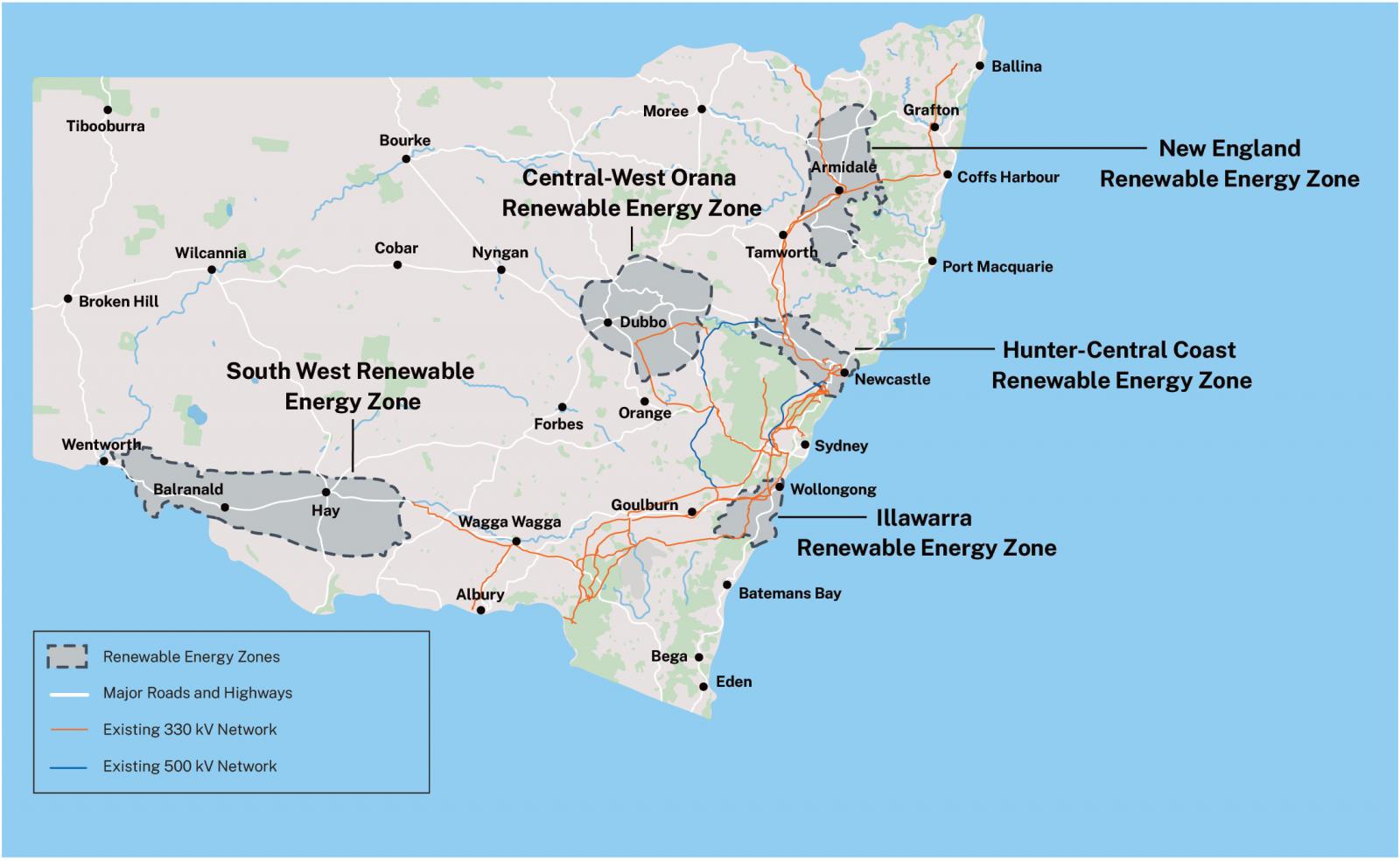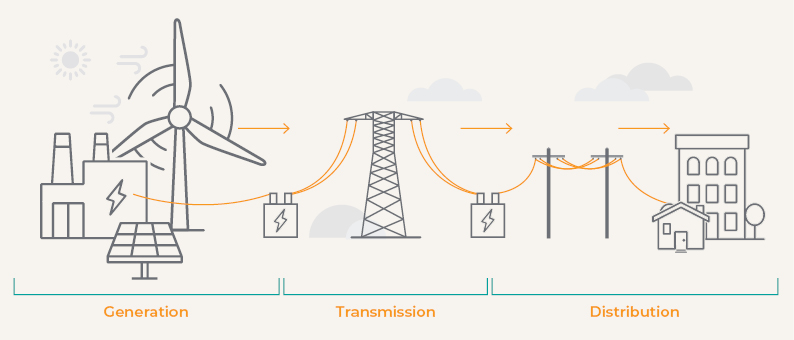Renewable Energy Infrastructure
EWON has expanded its jurisdiction to extend its services to landholders and community members across NSW’s renewable energy zones.
Initially, our new jurisdiction will extend to renewable energy transmission infrastructure only. Further expansion into renewable generation and storage, such as solar and wind farms and large-scale battery storage, is being explored in 2025.
EWON’s new function provides a ‘no wrong door’ referral service for community members, connecting them with the most appropriate channels to address their complaints if they fall outside the Ombudsman’s jurisdiction.
How can we help?
If you are a landholder or community member with a complaint about renewable energy infrastructure being developed near you and you are unsatisfied with how your complaint has been handled by the relevant entity, you can contact us. We work towards a fair and reasonable outcome for all parties but are not a consumer advocate, nor do we represent government or industry.
Please note that while we investigate and work to resolve complaints, it is not our role to stop or delay renewable energy infrastructure projects.
If your complaint is outside of our jurisdiction, our ‘no wrong door’ approach means we will connect you with the right people to address your complaint. We work closely with other government, community and industry organisations to make sure you can access the right service.
Make a complaint here or free call us on 1800 246 545.
- How we resolve complaints
- Engaging with regional communities
- Identifying systemic issues
- Useful factsheets and links
- FAQs
We will ask you for details of your complaint, what contact you have had with the company you are complaining about, their response and what you are seeking.
We will discuss your complaint, ensuring we understand the issues and background to date. We will provide independent advice and assistance, including detailing the applicable guidelines, rules and regulations, industry practice and other information relevant to your complaint. Some complaints are resolved at this stage by providing our independent advice.
We also investigate complaints by:
-
Requesting information from the transmission company (e.g. consultation processes or project files)
-
Requesting further information from you (e.g. letters or receipts)
-
Seeking independent expert advice (e.g. from an engineer or loss assessor) where appropriate
-
Continuing to investigate for as long as there are grounds to support further investigation, or until the matter is resolved.
All complaints are different, and the outcome will be based on our independent investigation of the information from you and the company. We consider what is fair and reasonable with regard to laws, codes and good industry practice. We complete our investigations as quickly as possible and will contact you at least once every two weeks to update you.
Currently, we only investigate complaints about EnergyCo, ACEREZ and Transgrid. This includes any contractors working on behalf of these companies. You must be directly affected by the issue as a landholder or community member.
If your complaint isn't related to a member of EWON, we have a 'no wrong door' approach where we will refer you to the most appropriate organisation who can assist you.
EWON carries out community engagement across NSW to raise awareness of our services and hear first-hand from community members about the impacts of renewable energy infrastructure.
This builds our understanding of the issues impacting regional communities, informs how we develop our tailored dispute resolution process, and allows us to develop educational resources for landholders, community members and community advocates. We also share our learnings with our members to help reduce the number of complaints coming to us.
Upcoming events:
- 9 - 10 April: Bring Your Bills Days, Albury and Wagga Wagga
- 2 - 4 May: Tocal Field Days, Tocal
If you would like EWON to attend an event in your region – in person or online, you can email us at community@ewon.com.au.
We identify, resolve and report on systemic issues. These are issues that do, or could, impact a large amount of people. We share these insights with government, regulators, members and other stakeholders to bring about changes in policy and regulation. Part of our role in managing renewable energy infrastructure complaints is to identify, resolve and report to the NSW Government on systemic issues we see in the complaints we receive.
EWON's factsheets
- Explaining EWON’s free referral service
- Complaint process
- New energy transmission
- Renewable energy infrastructure
Useful links
What is happening in renewable energy in NSW?
The electricity system is transitioning to renewable energy as NSW's coal-fired power stations are being retired over the next 20 years. This is part of Australia's plan to achieve net zero carbon emissions by 2050.
Under the NSW Government's NSW Electricity Infrastructure Roadmap, five Renewable Energy Zones have been selected to host the generation, transmission, storage and firming (backup sources) infrastructure. There is also some renewable energy infrastructure being built in other areas.
The five zones are:
-
Central-West Orana Renewable Energy Zone
-
New England Renewable Energy Zone
-
South-West Renewable Energy Zone
-
Hunter-Central Coast Renewable Energy Zone
-
Illawarra Renewable Energy Zone

Map of Renewable Energy Zones from EnergyCo.gov.au
Why did EWON establish an Energy Transition function?
The Energy Transition team was established to provide an investigation and resolution process for residents dissatisfied with the way their complaints are handled by the relevant transmission and renewable energy entities. The team will also actively engage with communities to better understand the issues they are facing, while informing the NSW Government of any systemic issues requiring action.
Our Energy Transition function will deliver:
-
Community engagement to educate/inform community members and landholders.
-
Dispute resolution through establishment of customised complaints management processes.
-
Working with new members to build and improve their internal complaint handling capability and capacity.
-
Development of internal and external resources and training.
-
Establishment of a Renewable Energy Infrastructure Advisory Group, made up of new members, government, industry and other stakeholders.
-
Systemic issues identification, advice and reporting to members, government and regulators to encourage widespread improvements.
What is the difference between electricity generation, transmission and distribution?
There are three stages in the electricity system needed to bring electricity from where it's made to your home.
-
Generation: Electricity is produced at the generator. Generators can include solar or wind farms, hydro systems and coal or gas power stations.
-
Transmission: The transmission network transports electricity at high voltages from generators to substations. They consist of transmission towers and wires, underground cables, transformers, switching equipment and more.
-
Distribution: Distribution networks deliver electricity from transmission networks to homes and businesses. The high voltage electricity is converted to a lower voltage by transformers located inside substations. The electricity is then transported in wires on poles or underground to individual electricity meters for each home and business.

What is a REZ?
Renewable Energy Zones are coordinated areas where renewable energy is generated, stored and transmitted. They will consist of large scale solar and wind farms, pumped hydro schemes and batteries designed to generate and store electricity efficiently in one location, where it will then be transmitted across NSW.
What is the NSW Electricity Infrastructure Roadmap?
The NSW Electricity Infrastructure Roadmap is a 20-year plan published in 2020 which details the NSW Government's plan to transform NSW's electricity system.
Can I make a complaint about rooftop solar?
Yes. While rooftop solar and home batteries are not part of the large-scale renewable energy infrastructure, EWON can still assist you through our complaints handling process.
Can I make a complaint about solar or wind farms?
While solar and wind farms are currently out of our jurisdiction, you can contact us and we'll discuss your complaint and provide you with relevant information. This will help us understand what complaints we are likely to receive in the future, as we are working with government in 2025 to explore further expanding our jurisdiction to large-scale generation and battery storage.
What do I need to do before I make a complaint?
You can read about what you should prepare before making a complaint to EWON
